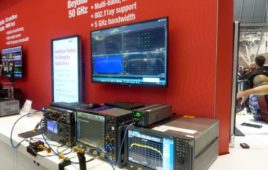As the FCC readies to tackle the 3.5 GHz Citizens Broadband Radio Service (CBRS) band at its open meeting later this month, the CBRS Alliance and Wireless Innovation (WInnForum) Forum on Tuesday touted the first generation of CBRS devices certified by the agency.
Vendors that received CBRS equipment certification include Ericsson, Nokia, Sercomm, and Arris’ Ruckus Networks.
“The Wireless Innovation Forum is excited to congratulate these members on receiving their FCC equipment authorizations,” said Lee Pucker, CEO of the Wireless Innovation Forum, in a statement. “This major milestone in the commercialization of the CBRS band represents the first of what we believe will be many more certifications announced over the next few months as the industry moves towards Initial Commercial Deployment.”
The device testing includes a demo to ensure that a Citizens Broadband Radio Service Device (CBSD) correctly communicates with a Spectrum Access System (SAS). The FCC certified devices are also the first to attain OnGo Certification from the CBRS Alliance.
“FCC authorization forms the foundation for OnGo Certification, so we are extremely pleased to see the first products receiving their Part 96 grants,” said Alan Ewing, Executive Director, CBRS Alliance. “We wish to thank the FCC and WInnForum for their hard work and dedication in helping reach this important milestone and enabling CBRS Alliance to initialize the OnGo Certification Program.”
A number of players are interested in the 3.5 GHz band for various uses, including AT&T. The telecom giant last month announced it had selected Samsung and CommScope for its fixed wireless deployments using spectrum in the CBRS band, with commercial rollouts slated for late 2019. AT&T said it will start by using LTE in the 3.5 GHz band, then shift to 5G.
“When we looked at CBRS spectrum, we saw a promising opportunity to use this spectrum band to expand our fixed wireless access network to additional cities across the U.S as well as other opportunities for future use cases,” said Gordon Mansfield, VP of converged access and device technology at AT&T, at the time.
Major cable operators have also expressed interested in the CBRS band, with Charter Communications, Comcast and Altice USA all conducting tests this year at 3.5 GHz.
Today, Inland Cellular, a small company serving southeastern Washington and north central Idaho, announced it was partnering with ExteNet systems to conducted field trials of a CBRS LTE fixed wireless network this month. A commercial rollout is targeted for early 2019, with the network leveraging ExteNet’s virtualized LTE Evolved Pact Core solution, along with Nokia’s RAN equipment.
“At Inland Cellular we are constantly evaluating ways to advance our customer experience and provide our customer base with enhanced service offerings. Applying the CBRS use case to our existing infrastructure seemed like a natural progression for us. We are excited to work with ExteNet on this initial trial and eventual commercial CBRS service rollout for our customers,” said Nathan Weis, CEO of Inland Cellular, in a statement.


